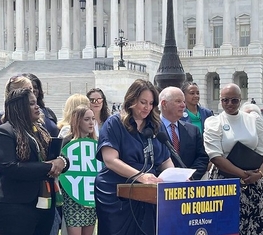Voting Rights Act (VRA)
WASHINGTON – Today the League of Women Voters of the United States issued the following statement in response to the reintroduction of the John Lewis Voting Rights Advancement Act in the Senate:
From Supreme Court decisions to voting rights legislation, 2023 was a busy year for our democracy. But how closely were you paying attention?
The League of Women Voters of the United States issued the following statement after the Eighth Circuit of Appeals ruled there is no “private right of action” for Section 2 of the Voting Rights Act.
This story was originally published by the Center for Public Integrity.
While restoration of the federal Voting Rights Act languishes in a split Congress, an already deep divide in Americans’ access to voting has widened over the past year.
During the 2022 Supreme Court term, the League of Women Voters filed amicus briefs in four cases: Moore v. Harper, Allen v. Milligan, Students for Fair Admissions v. Harvard, and 303 Creative, LLC v. Elenis.
We recap the case and its impact on voting rights, discrimination, and redistricting.
WASHINGTON – Today the League of Women Voters of the United States CEO Virginia Kase Solomón issued the following statement in response to the House reintroduction of the John Lewis Voting Rights Advancement Act:
Reflecting on the Voting Rights Act of 1965, it is crucial to acknowledge the hard work of diverse coalitions and dedicated activists who fought tirelessly for its passage. Their unwavering commitment to fairness and justice moved our country towards a more inclusive and democratic society.
JACKSON, Miss. — A federal court has granted a request by Disability Rights Mississippi, the League of Women Voters of Mississippi, and three Mississippi voters to block S.B. 2358 — a newly implemented state law that significantly diminishes access to the ballot for Mississippians who need assistance with voting.
WASHINGTON, DC — League of Women Voters of the United States CEO Virginia Kase Solomón issued the following statement in response to the House and Senate introduction of the Freedom to Vote Act:
Ten years ago, the Voting Rights Act's power to prevent election discrimination was undermined by the Supreme Court decision in Shelby County v. Holder.
The ruling's impact is still felt, as some politicians attempt to limit the electoral power of specific communities, such as Black and brown voters.





